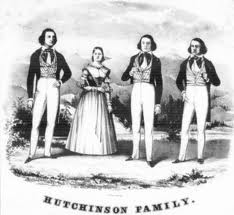|
|
Online Texts for Craig White's Literature Course
|
|
|
selections from Frederick Douglass (c. 1817-1895) My Bondage and My Freedom (1855) from CHAPTER XXIV.
|
|
. . . [T]he painful liability to be returned again to slavery, which haunted me by day, and troubled my dreams by night, proved to be a necessary step in the path of knowledge and usefulness. The writing of my pamphlet, in the spring of 1845, endangered my liberty, and led me to seek a refuge from republican slavery in monarchical England. [i.e., Narrative of the Life of Frederick Douglass] A rude, uncultivated fugitive slave was driven, by stern necessity, to that country to which young American gentlemen go to increase their stock of knowledge, to seek pleasure, to have their rough, democratic manners softened by contact with English aristocratic refinement. On applying for a passage to England, on board the "Cambria", of the Cunard line, my friend, James N. Buffum, of Lynn, Massachusetts, was informed that I could not be received on board as a cabin passenger. American prejudice against color triumphed over British liberality and civilization, and erected a color test and condition for crossing the sea in the cabin of a British vessel. The insult was keenly felt by my white friends, but to me, it was common, expected, and therefore, a thing of no great consequence, whether I went in the cabin or in the steerage.
Moreover, I felt that if I could not go into the first cabin, first-cabin passengers could come into the second cabin, and the result justified my anticipations to the fullest extent. Indeed, I soon found myself an object of more general interest than I wished to be; and so far from being degraded by being placed in the second cabin, that part of the ship became the scene of as much pleasure and refinement, during the voyage, as the cabin itself. The Hutchinson Family, celebrated vocalists -- fellow-passengers -- often came to my rude forecastle deck, and sung their sweetest songs, enlivening the place with eloquent music, as well as spirited conversation, during the voyage. In two days after leaving Boston, one part of the ship was about as free to me as another. My fellow-passengers not only visited me, but invited me to visit them, on the saloon deck. My visits there, however, were but seldom. I preferred to live within my privileges, and keep upon my own premises. I found this quite as much in accordance with good policy, as with my own feelings.
The effect was, that with the majority
of the passengers, all color distinctions were flung to the winds, and I found
myself treated with every mark of respect, from the beginning to the end of the
voyage, except in a single instance; and in that, I came near being mobbed, for
complying with an invitation given me by the passengers, and the captain of the
"Cambria," to deliver a lecture on slavery. Our New Orleans and Georgia
passengers were pleased to regard my lecture as an insult offered to them, and
swore I should not speak. They went so far as to threaten to throw me overboard,
and but for the firmness of Captain Judkins, probably would have (under the
inspiration of slavery
and brandy) attempted
to put their threats into execution. I have no space to describe this
scene, although its tragic and comic peculiarities are well worth describing. An
end was put to the melee,
by the captain's calling the ship's company to put the salt water mobocrats in
irons. At this determined order, the gentlemen of the lash scampered, and for
the rest of the voyage conducted themselves very decorously.

![]()


